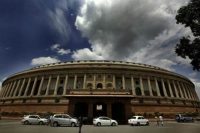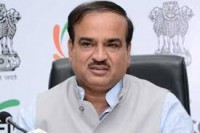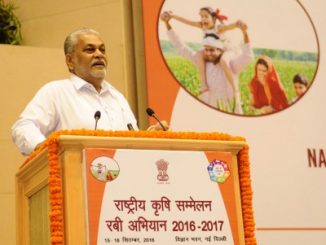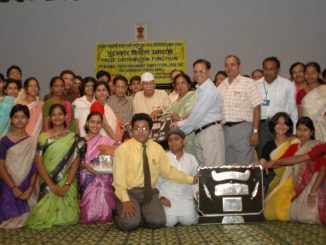
The Monsoon Session 2017 has been a successful session in terms of the legislative business conducted and wide participation of all political parties in discussions on various issues of national importance, said Shri Ananthkumar, Union Minister for Parliamentary Affairs and Chemicals & fertilizers, while addressing the media here today. Shri S.S. Ahluwalia, Minister of State for Agriculture & Farmers Welfare and Parliamentary Affairs and Shri Mukhtar Abbas Naqvi, Minister of State for Minority Affairs (IC) and Parliamentary Affairs, were also present on the occasion.
Shri Ananthkumar informed that the Monsoon Session, 2017 of Parliament which commenced on Monday, the 17th July, 2017, concluded on Friday, the 11th August, 2017. Both Houses were adjourned sine die. The Session provided 19 sittings spread over a period of 26 days. The productivity of Lok Sabha was 77.94% and that of Rajya Sabha was 79.95%.
During the Session, 17 Bills (17 in the Lok Sabha) were introduced. The Lok Sabha passed 14 Bills and while the Rajya Sabha passed 9 Bills during the session. 13* Bills were passed by both the Houses of Parliament. This has been an achievement considering that it was a short session of Parliament and a considerable time was devoted to discussions on important issues and the Elections to the Offices of President and Vice President of India, Shri Kumar added.
The Minister mentioned about the special discussion held in both Houses on 09.08.2017 to commemorate the 75th Anniversary of the ‘Quit India Movement’ and it is for the first time that the pledge of ‘Sankalp se Siddhi’ for building a New India by 2022 was taken with wide consensus among all parties. The Government is committed to achieve this vision of Prime Minister Shri Narendra Modi, the Minister added.
Talking about the extension of Goods and Services Tax (GST) to the State of Jammu & Kashmir, Shri Kumar said that this is a historic achievement as passing of the related bills will lead to the Economic Integration of the State with rest of the country.
Regarding the Legislative Business carried out during the Monsoon Session 2017, it was informed that during the Session Supplementary Demands for Grants for 2017-18 (including Railways) and Demands for Excess Grants for 2014-15 and the related Appropriation Bills, were discussed and passed by the Lok Sabha. These Bills were transmitted to Rajya Sabha on 02.08.2017 and could not be taken up for consideration and as they are not likely to be returned to Lok Sabha within the period of fourteen days from the date of their receipt in Rajya Sabha, the Bills will be deemed to have been passed by both Houses at the expiration of the said period in the form in which they were was passed by Lok Sabha under clause (5) of article 109 of the Constitution.
Four Bills replacing the Ordinances, namely, the Banking Regulation (Amendment) Ordinance, 2017, the Punjab Municipal Corporation Law (Extension to Chandigarh) Amendment Ordinance, 2017, the Central Goods and Services Tax (Extension to Jammu and Kashmir) Ordinance, 2017 and the Integrated Goods and Services Tax (Extension to Jammu and Kashmir) Ordinance, 2017 which were promulgated by the President, were considered and passed by Lok Sabha. Except the Banking Regulation (Amendment) Bill, 2017, the Bills replacing the remaining three Ordinances could not be taken up by Rajya Sabha. As these three Bills are money Bills and are not likely to be returned to Lok Sabha within the period of fourteen days from the date of their receipt in Rajya Sabha, the Bills will be deemed to have been passed by both Houses at the expiration of the said period in the form in which they were was passed by Lok Sabha under clause (5) of article 109 of the Constitution.
In the Lok Sabha, 2 Short Duration Discussions under Rule 193 were held on (i) the Agrarian Situation in the Country and (ii) the situation arising out of Reported Incidents of Atrocities and Lynching in mob violence in the Country.
In the Rajya Sabha, three Short Duration Discussions under Rule 176 were held on (i) the situation arising out of the reported increase in the incidents of lynching and atrocities on minorities and dalits across the country; (ii) on the farmers’ distress leading to rise in the incidents of their suicide in the country; and (iii) India’s foreign policy and engagement with strategic partners.
Besides one calling attention motion in Lok Sabha on problems arising due to floods in different parts of the Country and steps taken by the Government in this regard was discussed. Similarly, in Rajya Sabha two calling attention motions (i) on the situation arising out of recent floods in various parts of the country, particularly in Assam and (ii) situation arising out of violation of prescribed conditions of Letter of Permit by foreign trawlers in deep sea fishing in Indian seas and the action taken by the Government in regard thereto were discussed.
Three old pending Bills were withdrawn in the Rajya Sabha namely (i) The North-Eastern Council (Amendment) Bill, 2013; (ii) The Architects (Amendment) Bill, 2010; and (iii) The Participation of Workers in Management Bill, 1990.
*The five Bills, as passed by Lok Sabha and transmitted to Rajya Sabha for its recommendation, are not likely to be returned to Lok Sabha within the period of fourteen days from the date of their receipt in Rajya Sabha. The Bills will be deemed to have been passed by both Houses at the expiration of the said period in the form in which they passed by Lok Sabha under clause (5) of article 109 of the Constitution.
Legislative Business transacted during 12th Session of 16th Lok Sabha and 243rdSession of Rajya Sabha (Monsoon Session, 2017)
I – BILLS INTRODUCED IN LOK SABHA
- The Ancient Monuments and Archaeological Sites and Remains (Amendment) Bill, 2017
- The Banking Regulation (Amendment) Bill, 2017
- The State Banks (Repeal and Amendment) Bill, 2017
- The Indian Institute of Petroleum and Energy (IIPE) Bill, 2017;
- The Requisitioning and Acquisition of Immovable Property Amendment Bill, 2017
- The Central Road Fund (Amendment) Bill, 2017
- The Punjab Municipal Corporation Law (Extension to Chandigarh) Amendment Bill, 2017
- The Central Goods and Services Tax (Extension to Jammu and Kashmir) Bill, 2017.
- The Integrated Goods and Services Tax (Extension to Jammu and Kashmir) Bill, 2017
- The Public Premises (Eviction of Unauthorised Occupants) Amendment Bill, 2017
- The Appropriation (No.3) Bill, 2017
- The Appropriation (No.4) Bill, 2017
- The National Sports University Bill, 2017
- The Code on Wages, 2017
- The Financial Resolution and Deposit Insurance Bill, 2017
- The Right of Children to Free and Compulsory Education (Second Amendment) Bill, 2017
- The Repealing and Amending (Second) Bill, 2017
II – BILLS PASSED BY LOK SABHA
- The Indian Institutes of Information Technology (Amendment) Bill, 2017;
- The Right of Children Free and Compulsory Education (Amendment) Bill, 2017
- The Indian Institutes of Information Technology (Public-Private Partnership) Bill, 2017
- The Companies (Amendment) Bill, 2016
- The Indian Institute of Management Bill, 2017
- The Appropriation (No.3) Bill, 2017
- The Appropriation (No.4) Bill, 2017
- The Central Goods and Services Tax (Extension to Jammu and Kashmir) Bill, 2017;
- The Integrated Goods and Services Tax (Extension to Jammu and Kashmir) Bill, 2017
- The Banking Regulation (Amendment) Bill, 2017
- The Punjab Municipal Corporation Law (Extension to Chandigarh) Amendment Bill, 2017
- The National Bank for Agriculture and Rural Development (Amendment) Bill, 2017
- The Indian Institute of Petroleum and Energy (IIPE) Bill, 2017
- The State Banks (Repeal and Amendment) Bill, 2017
III – BILLS PASSED BY RAJYA SABHA
- The Footwear Design and Development Institute Bill, 2017
- The Admiralty (Jurisdiction and Settlement of Maritime Claims) Bill, 2017
- The Collection of Statistics (Amendment) Bill, 2017
- The National Institutes of Technology, Science Education and Research (Amendment) Bill, 2017
- The Indian Institutes of Information Technology (Public-Private Partnership) Bill, 2017
- The Constitution (One Hundred and Twenty Third Amendment) Bill, 2017 as amended
- The Right of Children Free and Compulsory Education (Amendment) Bill, 2017
- The Indian Institutes of Information Technology (Amendment) Bill, 2017
- The Banking Regulation (Amendment) Bill, 2017
IV – BILLS PASSED BY BOTH HOUSES OF PARLIAMENT
- The Footwear Design and Development Institute Bill, 2017
- The Admiralty (Jurisdiction and Settlement of Maritime Claims) Bill, 2017
- The Collection of Statistics (Amendment) Bill, 2017
- The National Institutes of Technology, Science Education and Research (Amendment) Bill, 2017
- The Indian Institutes of Information Technology (Public-Private Partnership) Bill, 2017
- The Right of Children Free and Compulsory Education (Amendment) Bill, 2017
- The Indian Institutes of Information Technology (Amendment) Bill, 2017
- The Banking Regulation (Amendment) Bill, 2017
- #The Appropriation (No.3) Bill, 2017
- #The Appropriation (No.4) Bill, 2017
- #The Central Goods and Services Tax (Extension to Jammu and Kashmir) Bill, 2017;
- #The Integrated Goods and Services Tax (Extension to Jammu and Kashmir) Bill, 2017
- #The Punjab Municipal Corporation Law (Extension to Chandigarh) Amendment Bill, 2017
V – BILLS WITHDRAWN
- The North-Eastern Council (Amendment) Bill, 2013
- The Architects (Amendment) Bill, 2010.
- The Participation of Workers in Management Bill, 1990
# The Bills, as passed by Lok Sabha and transmitted to Rajya Sabha for its recommendation, are not likely to be returned to Lok Sabha within the period of fourteen days from the date of its receipt in Rajya Sabha. The Bill will be deemed to have been passed by both Houses at the expiration of the said period in the form in which it was passed by Lok Sabha under clause (5) of article 109 of the Constitution.







Leave a Reply
You must be logged in to post a comment.